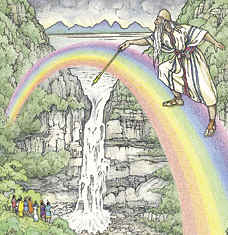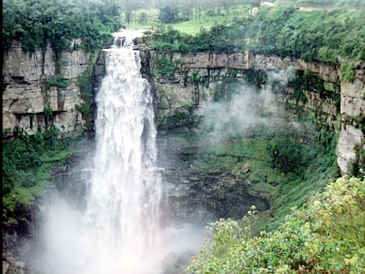Many
moons ago, during the childhood of humanity when everything was new, the people
worshipped many gods, praying for every last thing. And then one day a
gray-haired man came to the land of Colombia. He came from the highlands, from a
land known as Chingaza in the eastern part of that country, and he had an
important message for all the people.
He
was a startling sight - tall and fierce-looking, weathered and dressed in a
tunic. In his strong-bronzed hand he carried a large gold scepter. His name, he
told the people, was Bochica, and he wanted the people to learn how to care for
themselves. And so he began to teach them. He taught them to sow their fields,
and to plant and to harvest them. He taught them how to build houses, and how to
weave cotton and other fibers that they learned to grow in abundance upon their
land.
Bochica
also taught the people about time. He explained that there was a right time for
planting, a right time for harvesting, a time for the people to rejoice and
celebrate, a time for hard work, a time to be born and a time to die as well.
Bochica taught the people about good conduct. They must, he explained, learn to
work together, and they must be kind and generous to each other and to look
after those in need.
“You
needn’t turn to the gods for everything,” Bochica told the people. “You
can care for yourselves.” And so the people continued to praise their gods,
but they no longer waited helplessly for whatever might come. Instead, they
learned to build communities and to work together. And they loved their teacher,
Bochica.
Bochica
married a woman known as Huythaca, and for many years, he and his wife lived
together happily. Like those around them, Bochica and Huythaca cared for each
other. But as she grew older, Huythaca began to wish for more time and attention
from her husband. She complained that he spent too much time taking care of
others. She envied the commitment he felt toward the people.
“Stay
with me,” she begged when he set out to help the people till the soil. “Stay
with me and let the others do the work themselves. You have done enough.”
But
Bochica had taught the people about selflessness, about the importance of
giving. He shook his head at his wife’s request. “You must understand, this
is the way people must live,” he told her. “I must always be generous with
the people.”
“Be
generous to me,” Huythaca said. “I am your wife.”
But Bochica brushed away her words and paid no attention to his wife’s growing unhappiness. He was a good person, but even good

Bochica on the rainbow stopping
the flood
people
don’t always see clearly. Bochica did not notice that his wife’s envy was
turning to anger and bitterness.
As
the years passed, Huythaca’s bitterness grew. She began to resent the people,
and she dreamed of their destruction. One
day, when her seething fury had turned into a terrible fever, she walked to the
river’s edge. There she stood upon the banks and prayed. She prayed to
Chibchacun, god of the waters. She prayed that he would stir the waters, that
they would raise and flood the land, that even Bochica would be helpless to stop
the destruction that would invade the land.
